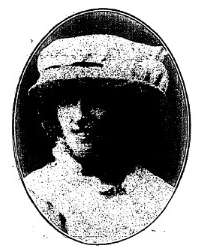Ethel Ayres Purdie

Ethel Ayres Purdie (née Ayres) (1874-1923) was a chartered accountant and suffragist. She specialised in counselling women and women's suffragist organisations. She was active in the Women's Tax Resistance League which argued that no vote meant no tax.
Personal life
Ethel Ayres was born in 1874 in Islington, London. Her father was an engineer toolmaker. After leaving school, she worked for the Post Office in the Telegraph Department. She married Frank Sidney Purdie in 1897, and they had two children.[1]
Career
Ayres Purdie began her suffragist work in 1894 at a trade union protest against the treatment of female telegraphists. The telegraphists contributed to pension funds that they never received, as the women typically left their jobs when they were married. Ayres' protest wanted women to receive a portion of the money.[2]
After her marriage, she studied accountancy at the Society of Arts.[3] Ayres Purdie opened her accountancy firm, which she named The Women Taxpayer’s Agency, in 1908.[4][1] In 1909, she finally became a member of the London Association of Accountants. In doing so, she became the first female registered accountant in the United Kingdom.[1] Her accountancy firm advertised in many women's papers, including Common Cause, Votes for Women and The Vote. The adverts encouraged women to collect a portion of their income tax, and argued against discrimination particularly from husbands who taxed their wives.[5] Ayres Purdie was the only woman allowed to represent clients in front of the Special Commissioners of Income Tax.[1] In 1912, her accountancy firm was vandalised by suffragettes, who argued that the inclusion of women in the firm's name was discriminatory.[4]
Ayres Purdie was the auditor for the Women's Freedom League, in particular she campaigned for more women in the accountancy industry. She was also an organiser of the Women's Tax Resistance League, which encouraged women not to pay taxes on principle, and provided assistance for them when faced with fines and prison sentences for not paying taxes.[6][7]
Publications
- Married Women & Tax Resistance (pamphlet), Women's Tax Resistance League, 1910
- Echoes, The Englishwoman, vol. 32, 1911, p. 224-8
- A red tape comedy, The Vote, vol. VII, no 160, 16 November 1912
- A red tape comedy II, The Vote, vol. VII, no 161, 23 November 1912
- A red tape comedy III, The Vote, vol. VII, no 162, 30 November 1912
- Married Women & Income Tax (pamphlet), Women's Tax Resistance League, 1913
References
- 1 2 3 4 "WALKS: Mrs Ayres Purdie, Kingsway And (Alas) Covent Garden Tube Station". Women and Her Sphere. Retrieved 11 June 2017.
- ↑ Ayres Purdie, Ethel (1911). "Echoes". The Englishwoman. Vol. 32. pp. 224–228.
- ↑ Walker, Stephen P. (2011). "ETHEL AYRES PURDIE: CRITICAL PRACTITIONER AND SUFFRAGIST" (PDF). Critical Perspectives on Accounting (pdf). 22 (1): 7. doi:10.1016/j.cpa.2010.09.001. Retrieved 11 June 2017.
- 1 2 "Mrs. Ayres Purdie victimised. "Pay up and shut up."". The Vote. 30 March 1912. Retrieved 11 June 2017.
- ↑ "Children, married women and lunatics are not so entitled". Votes for Women. 24 December 1908.
- ↑ Boussahba-Bravard, Myriam (2009). Résistance passive et citoyenneté : la rébellion de la contribuable anglaise (in French). pp. 104–134.
- ↑ Walker 2011, p. 7